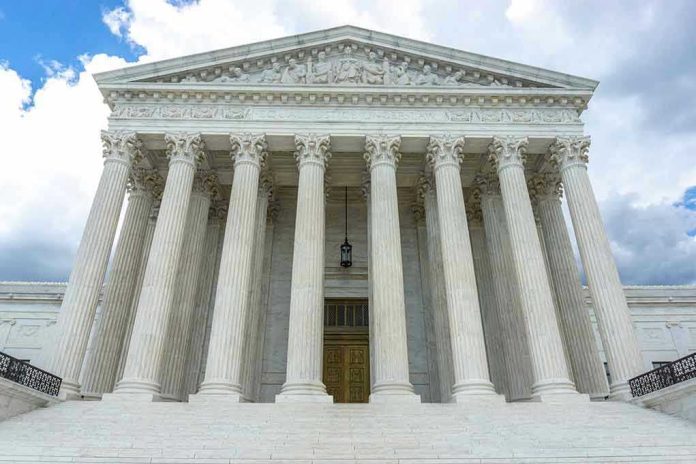
A Supreme Court case that could upend marriage equality—and reshape the meaning of religious liberty for every public servant in America—now hangs in the balance, with Kim Davis’s appeal daring the justices to reopen a Pandora’s box many thought was sealed in 2015.
Story Snapshot
- Kim Davis’s Supreme Court petition challenges both personal liability and the foundational precedent of nationwide same-sex marriage.
- The Court’s decision on whether to review the case could have sweeping implications for LGBTQ+ rights and religious freedom.
- Legal experts warn that even a narrow ruling could spark broader repercussions in the current political climate.
- The outcome will test the durability of marriage equality, and the boundaries of conscience for public officials.
Kim Davis: From County Clerk to Constitutional Flashpoint
Kim Davis, once an obscure clerk in Rowan County, Kentucky, became a lightning rod for a nation divided by culture wars. When the Supreme Court’s 2015 Obergefell v. Hodges decision legalized same-sex marriage, Davis cited her religious beliefs and refused to issue marriage licenses to same-sex couples. The courthouse became ground zero for a showdown, with couples denied their rights and Davis soon jailed for contempt. Her stand was not just about paperwork; it became a rallying cry for religious liberty advocates and a flashpoint for LGBTQ+ rights supporters across the country.
After her release, the legal battles intensified. Couples denied licenses sought damages, and lower courts sided against Davis—awarding compensation and rejecting her claim of qualified immunity. Davis’s appeal now lands before the Supreme Court, not just as a bid to shield herself from liability, but as an invitation for the justices to revisit the very foundation of marriage rights for same-sex couples. Her legal team’s arguments go beyond her own case, targeting the constitutionality of Obergefell itself and reigniting a debate that has smoldered beneath the surface for a decade.
Religious Liberty Versus Civil Rights: The Stakes for All Americans
The Supreme Court’s decision whether to hear Davis’s case arrives at a particularly fraught moment. The Court’s current conservative majority has raised anxieties among LGBTQ+ advocates, who worry that a decision to review could invite a rollback of hard-won rights. Legal experts, including the legal director at GLAD Law, emphasize that the technical focus is on damages and qualified immunity, not marriage rights per se. Yet, the specter of a broader ruling looms large, especially in a judicial climate that has recently revisited other established precedents.
For religious liberty groups, Davis’s stand is a matter of conscience—a test case for whether government employees must violate their beliefs in the course of public duty. For the plaintiffs, like David Moore and David Ermold, the issue is personal and profound: the right to be treated equally under the law, without exception. The case has attracted legal advocacy groups on both sides, and state governments nationwide watch closely, aware that a ruling in Davis’s favor could create legal uncertainty for marriage licensing and other civil processes.
Marriage Equality at a Crossroads: Legal, Social, and Political Impact
If the Supreme Court grants review, the legal landscape could shift dramatically. In the short term, LGBTQ+ communities fear renewed instability, with marriage rights potentially subject to legal challenge or new limitations. Political mobilization around Supreme Court nominations and legislative protections is likely to intensify, as both sides brace for a decision with far-reaching effects.
Long-term, the implications extend beyond the marriage question. A ruling that narrows or overturns Obergefell could destabilize related rights in employment, healthcare, and family law—areas where recognition of same-sex marriage has provided legal clarity and security. State and local governments may find themselves caught in conflicting mandates, forced to navigate between federal precedent and local officials’ religious objections. The debate will almost certainly amplify polarization over the proper balance between religious liberty and civil rights, reverberating through courtrooms and legislatures for years to come.
Expert Analysis: Real Risks or Remote Possibilities?
Most legal scholars view Davis’s case as an unlikely vehicle for overturning Obergefell, arguing that the Supreme Court rarely uses narrow cases focused on damages to revisit landmark constitutional precedents. Yet, the unpredictability of the current Court leaves room for concern. SCOTUSblog notes that while such reviews are rare, the justices’ willingness to reconsider settled law cannot be discounted.
Advocacy groups on both sides agree: the stakes are enormous, even if the odds of a sweeping reversal remain slim. LGBTQ+ organizations warn that any sign of retreat from marriage equality could embolden challenges nationwide. Religious liberty advocates see Davis as a standard-bearer for conscience rights, arguing that government service should not force individuals to choose between faith and job security. The ultimate decision will not just affect Kim Davis or the couples who once stood at her counter—it will test the resilience of rights and the boundaries of belief in American public life.



